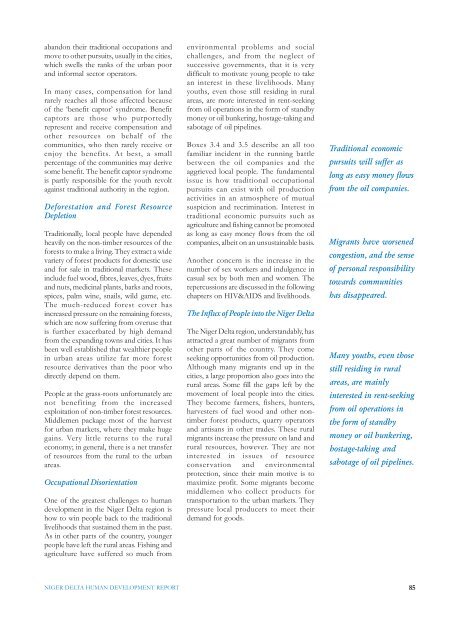Niger Delta Human Development Report - UNDP Nigeria - United ...
Niger Delta Human Development Report - UNDP Nigeria - United ...
Niger Delta Human Development Report - UNDP Nigeria - United ...
Create successful ePaper yourself
Turn your PDF publications into a flip-book with our unique Google optimized e-Paper software.
abandon their traditional occupations and<br />
move to other pursuits, usually in the cities,<br />
which swells the ranks of the urban poor<br />
and informal sector operators.<br />
In many cases, compensation for land<br />
rarely reaches all those affected because<br />
of the ‘benefit captor’ syndrome. Benefit<br />
captors are those who purportedly<br />
represent and receive compensation and<br />
other resources on behalf of the<br />
communities, who then rarely receive or<br />
enjoy the benefits. At best, a small<br />
percentage of the communities may derive<br />
some benefit. The benefit captor syndrome<br />
is partly responsible for the youth revolt<br />
against traditional authority in the region.<br />
Deforestation and Forest Resource<br />
Depletion<br />
Traditionally, local people have depended<br />
heavily on the non-timber resources of the<br />
forests to make a living. They extract a wide<br />
variety of forest products for domestic use<br />
and for sale in traditional markets. These<br />
include fuel wood, fibres, leaves, dyes, fruits<br />
and nuts, medicinal plants, barks and roots,<br />
spices, palm wine, snails, wild game, etc.<br />
The much-reduced forest cover has<br />
increased pressure on the remaining forests,<br />
which are now suffering from overuse that<br />
is further exacerbated by high demand<br />
from the expanding towns and cities. It has<br />
been well established that wealthier people<br />
in urban areas utilize far more forest<br />
resource derivatives than the poor who<br />
directly depend on them.<br />
People at the grass-roots unfortunately are<br />
not benefiting from the increased<br />
exploitation of non-timber forest resources.<br />
Middlemen package most of the harvest<br />
for urban markets, where they make huge<br />
gains. Very little returns to the rural<br />
economy; in general, there is a net transfer<br />
of resources from the rural to the urban<br />
areas.<br />
Occupational Disorientation<br />
One of the greatest challenges to human<br />
development in the <strong>Niger</strong> <strong>Delta</strong> region is<br />
how to win people back to the traditional<br />
livelihoods that sustained them in the past.<br />
As in other parts of the country, younger<br />
people have left the rural areas. Fishing and<br />
agriculture have suffered so much from<br />
NIGER DELTA HUMAN DEVELOPMENT REPORT<br />
environmental problems and social<br />
challenges, and from the neglect of<br />
successive governments, that it is very<br />
difficult to motivate young people to take<br />
an interest in these livelihoods. Many<br />
youths, even those still residing in rural<br />
areas, are more interested in rent-seeking<br />
from oil operations in the form of standby<br />
money or oil bunkering, hostage-taking and<br />
sabotage of oil pipelines.<br />
Boxes 3.4 and 3.5 describe an all too<br />
familiar incident in the running battle<br />
between the oil companies and the<br />
aggrieved local people. The fundamental<br />
issue is how traditional occupational<br />
pursuits can exist with oil production<br />
activities in an atmosphere of mutual<br />
suspicion and recrimination. Interest in<br />
traditional economic pursuits such as<br />
agriculture and fishing cannot be promoted<br />
as long as easy money flows from the oil<br />
companies, albeit on an unsustainable basis.<br />
Another concern is the increase in the<br />
number of sex workers and indulgence in<br />
casual sex by both men and women. The<br />
repercussions are discussed in the following<br />
chapters on HIV&AIDS and livelihoods.<br />
The Influx of People into the <strong>Niger</strong> <strong>Delta</strong><br />
The <strong>Niger</strong> <strong>Delta</strong> region, understandably, has<br />
attracted a great number of migrants from<br />
other parts of the country. They come<br />
seeking opportunities from oil production.<br />
Although many migrants end up in the<br />
cities, a large proportion also goes into the<br />
rural areas. Some fill the gaps left by the<br />
movement of local people into the cities.<br />
They become farmers, fishers, hunters,<br />
harvesters of fuel wood and other nontimber<br />
forest products, quarry operators<br />
and artisans in other trades. These rural<br />
migrants increase the pressure on land and<br />
rural resources, however. They are not<br />
interested in issues of resource<br />
conservation and environmental<br />
protection, since their main motive is to<br />
maximize profit. Some migrants become<br />
middlemen who collect products for<br />
transportation to the urban markets. They<br />
pressure local producers to meet their<br />
demand for goods.<br />
Traditional economic<br />
pursuits will suffer as<br />
long as easy money flows<br />
from the oil companies.<br />
Migrants have worsened<br />
congestion, and the sense<br />
of personal responsibility<br />
towards communities<br />
has disappeared.<br />
Many youths, even those<br />
still residing in rural<br />
areas, are mainly<br />
interested in rent-seeking<br />
from oil operations in<br />
the form of standby<br />
money or oil bunkering,<br />
hostage-taking and<br />
sabotage of oil pipelines.<br />
85










